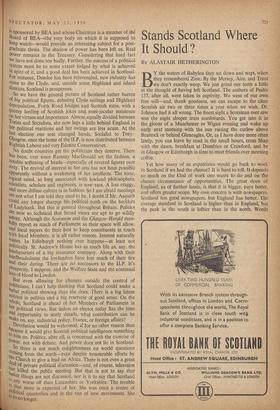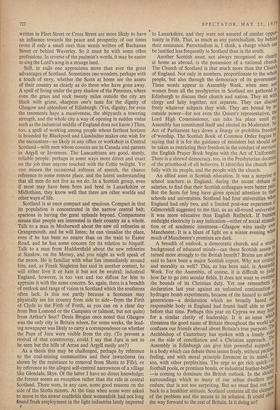Stands Scotland Where It Should?
BY ALASTAIR HETHERINGTON Yet how many of us expatriates would go back to work in Scotland if we had the chance? It is hard to tell. It depends so much on the kind of work one wants to do and on the chance circumstance of opportunities. The great draw of England, as of farther lands, is that it is bigger, pays better, and offers greater scope. My own concern is with newspapers. Scotland has good newspapers. but England has better. The average standard in Scotland is higher than in England, but the peak in the south is loftier than in the north. Words written in Fleet Street or Cross Street are more likely to have an influence towards the peace and prosperity of our times (even if only a small one) than words written off Buchanan Street or behind Waverley. So it must be with some other professions. In reverse of the psalmist's words, it may be easier to sing the Lord's song in a strange land.
Still, in exile one appreciates more than ever the great advantages of Scotland. Sometimes one wonders, perhaps with a touch of envy, whether the Scots at home see the assets of their country as clearly as do those who have gone away. A spell of living under the grey shadow of the Pennines, where even the grass and rock twenty miles outside the city are black with grime, sharpens one's taste for the dignity of Glasgow and splendour of Edinburgh. (Yes, dignity; for even the tenements haye a massiveness, the shipyards a towering strength, and the whole city a way of opening in sudden vistas such as the industrial middle of England does not know.) Then, too, a spell of working among people whose farthest horizon is bounded by Blackpool and Llandudno makes one wish for the encounters—so likely in any office or workshop in Central Scotland—with men whose cousins are in Canada and parents in Argyll or Inverness. The Lancastrians are good, sturdy, reliable people; perhaps in some ways more direct and exact on the job than anyone touched with the Celtic twilight. Yet one misses the occasional softness of speech, the chance reference to some remote place, and the latent understanding that all men do not live as we do. In a Scottish group, even if most may have been born and bred in Lanarkshire or Midlothian, they know well that there are other worlds and other ways of life.
Scotland is at once compact and spacious. Compact in that its population is concentrated in the narrow central belt; spacious in having the great uplands beyond. Compactness means that people are interested in their country as a whole. Talk to a man in Motherwell about the new oil refineries at Grangemouth, and he will listen; he can visualise the place, even if he has been no nearer than on the train to Easter Road, and he has some concern for its relation to himself. Talk to a man from Huddersfield about the new refineries at Stanlow, on the Mersey, and you might as well speak of the moon. He is familiar with what lies immediately around him, and, as Frank Singleton has said in another context, he will either love it or hate it but not be neutral; industrial England, however, is too vast and too diffuse for him to appraise it with the same concern. So, again, there, is a breadth of outlook and range of vision in Scotland which the southrons often lack. Is this not partly because a Scotsman may physically see his country from side to side—from the Firth of Clyde to the Firth of Forth, as you can on a clear day from Ben Lomond or the Campsies or (almost, but not quite) from Arthur's Seat? Denis Brogan once noted that Glasgow was the only city in Britain where, for some weeks, the lead- ing newspaper was likely to carry a correspondence on whether the Paps of Jura were visible from the city. (To prevent a revival of that controversy, could I say that Aga is not to be seen but the hills of Arran and Argyll easily are?) As a thesis this may be challenged, perhaps by reference to the coal-mining communities and their inwardness (as shown by the resistance to removal from Shotts to Fife), or by reference to the alleged self-centred narrowness of a village like Glendale, Skye. Of the latter I have no direct knowledge; the former seems an exception rather than the rule in central Scotland. There were, in any case, some good reasons on the side of the Shotts miners. At the time when some were asked to move to the newer coalfields their womenfolk had not long found fresh employment in the light industries lately imported to Lanarkshire, and they were not assured of similar opPer: tunity in Fife. That, as much as any parochialism, lay behinn their resistance. Parochialism is, I think, a charge which can be justified less frequently in Scotland than in the south. Another Scottish asset, not always recognised so clearlY at home as abroad, is the possession of a national church, The Church of Scotland is that much more than the Church of England. Not only in numbers, proportionate to the whole people, but also through the democracy of its government' These words appear in Assembly Week, when men and women from all the presbyteries in Scotland are gathered is Edinburgh to discuss their church and nation. They sit with clergy and laity together, not separate. They can discuss freely whatever subjects they wish. They are bound by 110 outside power—for not even the Queen's representative, the Lord High Commissioner, can take his place until the Assembly has constituted itself and elected its Moderator. NI° Act of Parliament lays down a liturgy or prohibits freedoin of worship. The Scottish Book of Common Order begins bY saying that it is for the guidance of ministers but should flat be taken as restricting their freedom in the conduct of services; the English Prayer Book begins with the Act of UniforinitY• There is a shrewd democracy, too, in the Presbyterian doctrine of the priesthood of all believers. It identifies the church most fully with its people, and the people with the church. An allied asset is Scottish education. It was a surprise in school teachers in England, during the recent debate 011 salaries, to find that their Scottish colleagues were better paiu,' But the Scots for long have given special attention to the schools and universities. Scotland had four universities Wbel; England had only two, and a limited post-war experience 01 Gilmorehill suggested to me that, as an all-round universit0 it was more educative than English Redbrick. If burning midnight electricity is any indication—either of social stimula: tion or of academic intentness—Glasgow wins easily ovo Manchester. It is a blaze of light on a winter evening wit° much of Manchester's premises are dark. A breadth of outlook, a democratic church, and a stur,d! background of educated minds—can these Scottish assets IP turned more strongly to the British benefit? Brains are alwaYs, said to have been a major Scottish export. Why not courag: and morality as well? This, as has been said, is Asse11311 Week. For the Assembly, of course, it is difficult to judg, how far to go into secular fields. It does not want to overste.is the bounds of its Christian duty. Yet one remembers declaration last year against an unlimited continuation ° hydrogen bomb experiments, because of the hazard to unhonld generations—a declaration which no broadly based 0,,e responsible body in England had found itself able to mat'e before that time. Perhaps this year on Cyprus we may h°,PD for a similar clarity of leadership. It is an issue willed threatens the good name of Britain throughout the world ane confuses our friends abroad about Britain's true purpose. Archbishop of Canterbury has spoken with a lonely v,,,01,"0 on the side of conciliation and a Christian approach. Pit Assembly in Edinburgh can give him powerful support. '11 is a body which can debate these issues freely, without partis4, feeling, and with moral principle foremost in its mind. too, with other perplexities. The urge to get rich quick" football pools, or premium bonds, or industrial feather-becicilliA, —is coming to dominate the British outlook. In the shodusl surroundings which so many of our urban dwellers 0111,,,,, endure, that is not too surprising. But we must find our VI back to a healthier attitude. Scotland contains all the elenlell, of the problem and the means to its solution. It could sha' the way forward to the rest of Britain. Is it doing so?











































 Previous page
Previous page